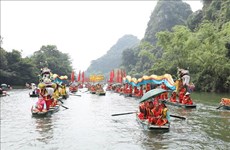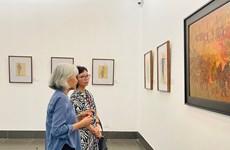Int’l workshop featuring Bai choi singing to be held
An international workshop featuring Vietnam’s Bai choi singing and
similar arts in the world will be held in Quy Nhon city, the central
province of Binh Dinh, on January 13-14.
An international workshop featuring Vietnam’s Bai choi singing and
similar arts in the world will be held in Quy Nhon city, the central
province of Binh Dinh, on January 13-14.
Over 20 reports on the folk singing and world similar arts will be presented at the event by cultural researchers from France, Germany, Sweden, the Republic of Korea, Laos and Vietnam, Nguyen Binh Dinh, Director of the Vietnam National Academy of Music, told a press conference on the workshop in Quy Nhon on January 6.
Participants will also hear opinions from leaders and managers of the nine central coastal provinces, namely Quang Binh, Quang Tri, Thua Thien-Hue, Da Nang, Quang Nam, Quang Ngai, Binh Dinh, Phu Yen and Khanh Hoa.
They will focus on the history and culture of the central coastal localities, the performance art and music, as well as measures to preserve and promote the values of the Bai Choi singing with a view to completing a dossier to seek the recognition of the folk singing as a UNESCO intangible cultural heritage in 2016.
Unique to the central coastal region, Bai choi is often seen at local spring festivals and resembles a game, using playing cards and village huts.
The stage for Bai choi performances encompasses nine cottages, each containing five or six ‘players’. One of the cottages, the central house, contains a troupe of musicians and instruments. A deck of playing cards is split in half, with one stack distributed amongst the players, and the other placed in the central house. The cards are stuck onto bamboo poles and erected outside the cottages.
The game singer delivers a flag to each cottage, all the while singing Bai choi, and then draws a card from the central house. Whoever holds the card closest in value to the game singer’s card wins.
The Bai choi songs are about festivals, daily life and work, and are accompanied by musical instruments.
The game and songs were developed by Mandarin Dao Duy Tu (1572-1634) to help locals protect their crops, according to Hoang Chuong, Director of the Centre for Preservation and Promotion of National Culture.-VNA
Over 20 reports on the folk singing and world similar arts will be presented at the event by cultural researchers from France, Germany, Sweden, the Republic of Korea, Laos and Vietnam, Nguyen Binh Dinh, Director of the Vietnam National Academy of Music, told a press conference on the workshop in Quy Nhon on January 6.
Participants will also hear opinions from leaders and managers of the nine central coastal provinces, namely Quang Binh, Quang Tri, Thua Thien-Hue, Da Nang, Quang Nam, Quang Ngai, Binh Dinh, Phu Yen and Khanh Hoa.
They will focus on the history and culture of the central coastal localities, the performance art and music, as well as measures to preserve and promote the values of the Bai Choi singing with a view to completing a dossier to seek the recognition of the folk singing as a UNESCO intangible cultural heritage in 2016.
Unique to the central coastal region, Bai choi is often seen at local spring festivals and resembles a game, using playing cards and village huts.
The stage for Bai choi performances encompasses nine cottages, each containing five or six ‘players’. One of the cottages, the central house, contains a troupe of musicians and instruments. A deck of playing cards is split in half, with one stack distributed amongst the players, and the other placed in the central house. The cards are stuck onto bamboo poles and erected outside the cottages.
The game singer delivers a flag to each cottage, all the while singing Bai choi, and then draws a card from the central house. Whoever holds the card closest in value to the game singer’s card wins.
The Bai choi songs are about festivals, daily life and work, and are accompanied by musical instruments.
The game and songs were developed by Mandarin Dao Duy Tu (1572-1634) to help locals protect their crops, according to Hoang Chuong, Director of the Centre for Preservation and Promotion of National Culture.-VNA













